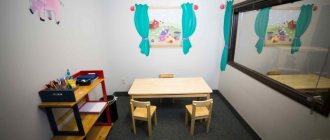Speech therapists and speech pathologists – they work in the same field, have a common education and similar working methods. During their studies, they are connected by a common faculty and a number of disciplines. Both of them study psychiatry, neuralgia, psychology and pedagogy. All their activities are not just correction of sound pronunciation, but also individual interaction with the child.
There is so much in common, but, nevertheless, these are two different specialists, and here the question arises: what kind of teacher does a child need to say goodbye to psychophysical disabilities? Speech therapist and defectologist - what's the difference ? Let's find out below.
When is this or that specialist needed?
In recent years, more and more children are faced with developmental disorders, and more and more parents are looking for a competent and experienced specialist. Children who, for one reason or another, have problems with adaptation, speech development, communication and learning at school or kindergarten need the help of a highly specialized specialist. The root of the problem may be as follows:
- birth injuries;
- infections acquired during fetal development;
- diseases that arise at an early stage of development;
- disorders of neuralgic and psychological nature.
This is only a small part of the existing reasons. More specifically, parents whose children have been diagnosed with cerebral palsy, autism, echolalia, hearing or vision impairment often seek help.
Features of the work of a speech therapist
A speech therapist is a kind of defectologist, but there are nuances here. Defectology is usually called a scientific discipline from the category of pedagogy, which develops and applies all kinds of methods aimed at eliminating developmental deficiencies. The methods belong to the class of restorative and educational. Main directions of the discipline:
- Speech therapy is a part of pedagogy based on speech difficulties.
- Deaf pedagogy – works exclusively with children who are hard of hearing or completely deaf.
- Typhlopedagogy – works with those who have visual disorders.
- Oligophrenopedagogy – helps children with severe mental retardation.
Thus, speech therapists are highly specialized defectologists who specialize in the correction of speech deviations. Defectologists include teachers of the deaf, oligophrenopedagogues, and typhlopedagogues. This is the main answer to the question “what is the difference between a defectologist and a speech therapist?”
What a defectologist should know and be able to do
To work productively, a defectologist must have a number of personal and professional skills.
The main personal qualities needed by a defectologist are love for children and patience. Working with children with disabilities is much more difficult than with ordinary children. Children with disabilities and mental retardation perceive information more difficultly and require a lot of attention and a special approach, which can be difficult to find.
This specialty should be considered by those educators and teaching staff who consider working with children to be their calling. The teacher must be emotionally stable so as not to take the problems and illnesses of children too personally. The main task of a defectologist is to provide professional assistance, and not to empathize.
A defectologist must have deep knowledge in psychology and pedagogy, master the basics of medicine and understand how various deviations affect the overall development of the child. He must study and be able to apply methods of interaction with special children and their parents in order to correctly diagnose problems and find ways to solve them. This knowledge can only be obtained in a professional educational institution.
The work of a defectologist relates to special pedagogy. This is a difficult direction that requires a lot of dedication. But when students make their first progress, all the time and effort spent on classes pays off many times over. The correctional teacher feels proud of his students.
What does a speech therapist usually do?
Adults seek the help of a specialist when they identify language disorders in their child. It is not difficult to find a speech therapist in the city: their “habitat” is schools, boarding schools, kindergartens, clubs, development centers and even clinics.
Before a speech therapist begins working with a child, it is necessary to establish an accurate diagnosis, and a psychological and medical commission will undertake this. They find the “root” of speech pathology, and the speech therapist, based on the diagnosis, selects an effective technique to prevent disorders.
Sometimes parents look at the work of a speech therapist superficially, believing that their task is to correct incorrect pronunciation of letters and sounds. The work of a specialist is much more ambitious - it is aimed at improving speech in general. The teacher helps:
- normalize coherent speech;
- correct incorrect pronunciation of sounds;
- expand your vocabulary;
- improve phonemic awareness;
- develop grammatical skills;
- work on nonverbal communication (movements, gestures).
While working with a speech therapist, the child learns to competently ask questions, invent stories and conduct dialogues. The interlocutors in the dialogues are both other children and adults. In addition, the teacher sets the goal of preventing written disorders, developing memory, thinking, motor skills and perception of the surrounding space.
All of the above is how a speech therapist differs from a defectologist , but in the work of the latter there are many overlapping tasks.
Lack of specialists for new profiles
Recently, the target numbers for admission to universities in these areas have begun to decline, Georgy Kryukov, executive director of the Union of Defectologists, a member of the expert council on special education under the State Duma Committee on Education and Science, noted in a conversation with Izvestia. For example, in the Moscow region they decreased by half - from 80 to 40, and this situation is observed in many regions, he emphasized. “We also carried out monitoring, which showed that admission numbers are not particularly tied to the needs of the region. That is, the same way they trained so many speech therapists there is how they train them, and this does not cover the real needs,” points out Georgy Kryukov.
And study again: which universities will be able to provide a second degree for free?
And how many budget places in creative specialties will adult applicants take?
At the same time, the number of children who need such specialists is growing every year. About 600 thousand children are currently studying in correctional schools alone. In addition, a lot of children are in an inclusive form of education, and there are also preschoolers.
— Among schoolchildren there are almost 600 thousand children with disabilities, that is, with hearing impairment, visual impairment, musculoskeletal system, speech, intelligence, as well as with autism and severe multiple disabilities. Therefore, naturally, more specialists are required. There is order No. 115 of the Ministry of Education, which determines how many children a specialist of the relevant profile should be assigned to. For example, how many children should there be one defectologist, one speech therapist at school, in kindergarten - all this is spelled out there. So, if you take these standards, then this is absolutely not implemented anywhere. In reality, there are much fewer such specialists, so it is necessary to train them.
Pure diction
Photo: RIA Novosti/Vladimir Vyatkin
But there are other subtleties here, notes Georgy Kryukov. According to him, there is currently no shortage of speech therapists in Russia, and many oligophrenopedagogues are being trained.
— But categories appear that, in fact, did not exist before. For example, autism spectrum disorder—this category was not identified at all 20–30 years ago. Now their number is very significant among other children with disabilities, and there are very few places where specialists are trained. And if such a child comes to a regular school for inclusive education (parents have the right to insist that the child study at their place of residence), then who knows how to deal with such a child?
Earning money smartly: where in Russia they increase scholarships for talented students
Monthly payments for first-year students in the regions reach 100 thousand rubles
In addition, if a child cannot be alone in the classroom, especially among normotypical peers, then by law he is entitled to a tutor or technical assistant to help. There are also not enough such specialists today, Kryukov emphasizes. “Previously, there was also no such category as children with severe multiple disabilities. And almost no one knows how to work with them; not enough such specialists are trained,” he noted.
Features of the work of a teacher-defectologist
The activities of a professional in the field of defectology depend on his specialization. The child needs his methods when problems arise that cannot be solved during classical education. A defectologist must be an expert in the disorder that is inherent in the child. Namely, in speech, visual, auditory or intellectual. For example, if a speech disorder arose against the background of mental retardation, the leading teacher will be an oligophrenopedagogist.
Let us give a clear example: if a child has hearing problems, the teacher’s work is aimed at developing non-verbal communication. If problems are related to vision, spatial orientation training takes place.
First acquaintance: speech pathologist or speech therapist, find 10 differences
Dear parents, colleagues and everyone interested in this material, in this article I would like to clarify
some questions that arise at almost every meeting and conversation with you. And the question goes like this:
“What, a speech therapist and a defectologist are not the same thing?”...
Who is a defectologist?
There is a profession that combines medicine and pedagogy. The training program for defectologists includes such fundamentals as neurology and psychiatry, psychology and pedagogy, pediatrics, ophthalmology, etc.
A defectologist is a teacher who specializes in teaching children with disabilities in intellectual development, who is involved in their upbringing, training and adaptation to life in society.
A defectologist is, first of all, a person who has received the appropriate education. The teacher must be able to diagnose existing deviations in children and look for ways to compensate for them, as well as conduct a certain course of classes aimed at the development of a problem child. A specialist in the field of defectology should become the best friend and adviser for special children and their parents.
Defectological specialties:
The science of defectology includes several main areas:
- deaf pedagogy – teaching children with both obvious and minor deviations in the functioning of the hearing aid;
- oligophrenopedagogy – teaching children with intellectual underdevelopment;
-typhlopedagogy – teaching children whose visual apparatus is impaired;
-speech therapy – training of children whose intellectual development is almost within the age norm, but there are speech disorders identified in pronunciation, disorders of phonemic perception.
The profession of a defectologist: goals and objectives.
The goals that the teacher-defectologist sets for himself:
- Create a desire to learn through motivation.
- To compensate for the deficit of general knowledge, to replenish the development of the speech apparatus, to teach literacy, reading, design, and play.
Focusing on goals, a specialist working with special children solves the following tasks:
- Conducts corrective work regarding existing deviations in the development of students.
- Examines children to identify the structure and severity of their inherent defects.
- Conducts classes aimed at correcting developmental abnormalities and restoring functional characteristics.
- Classes with problem children are based on the use of certain methods and techniques.
- The choice of one or another methodological program depends on the specifics of the existing deviations in students.
- Conducts consultations and conversations with children's parents.
Functions of a teacher-defectologist
- Conducts a detailed examination of the child, based on which he diagnoses his learning abilities.
- When developmental deviations are identified, work is organized aimed at maximizing the replenishment and restoration of developmental deficiencies.
- Conducts classes aimed at developing basic mental processes (perception, attention, memory, thought processes, etc.).
- Develops children's communication abilities.
- Thus, to compensate for the development of preschool children, the defectologist in kindergarten focuses on play activities, for schoolchildren - on reading, writing, etc.
Myths about the work of a defectologist
Myth 1. For inexplicable reasons, people have the opinion that a defectologist specializes in working exclusively with children who have significant deviations in mental and physical functions.
This is not true. He can help any child who has problems learning the material.
A defectologist is a multidisciplinary teacher who knows how to choose the right teaching method for a particular child. Myth 2. Classes with a specialist in the field of defectology will last forever. This is far from true, or rather, it is not entirely true. If the deviations are temporary, then correctional measures end when the teacher helps the child fill the gaps in knowledge; for children with a complex structure of the defect, a further educational route is developed.
Speech therapist and defectologist: what are the main differences:
The main differences between a defectologist and a speech therapist are as follows:
- The target audience. A defectologist works with special children who have certain deviations in mental and physical development, and a speech therapist works with children with intact intelligence who have speech problems. Violations can range from mild (violations of phonetic-phonemic perception) to severe speech underdevelopment.
- Purpose of the lesson. A defectologist at school strives to help the child learn to express his thoughts, restores gaps in knowledge, and applies measures to correct intellectual development. A speech therapist works mainly on the development of general speech activity, the accumulation of vocabulary, the development of physical and speech hearing, the grammatical aspect of speech, teaching word formation and inflection skills, the development of articulatory motor skills, and the development of coherent speech.
- Restrictions on the age category of children. A speech pathologist can conduct classes with very young children (starting from 1 year), but there is no need to rush into classes with a speech therapist until the child is three years old. In addition, an adult can also consult a speech therapist.
- A defectologist is a wide-profile specialist, something that a speech therapist, whose field of activity is much smaller, cannot boast of.
The profession of a defectologist is close in essence to the profession of a speech therapist, but there is a significant difference between them. She is also close to the profession of teacher, psychologist, doctor, and kindergarten teacher. I really hope that after reading this article no one will ask a defectologist. :
“What, a speech therapist and a defectologist are not the same thing?”...
Teacher-defectologist Umnova T.V.
Materials used for this article:
T. B. Epifantseva “Handbook for a teacher-defectologist”
E.A. Strebelev "Pedagogical support of the family,
raising a young child with developmental disabilities"
Materials from the Internet
General tasks of speech pathologists
The main work of specialists is aimed at developing the child’s cognition, which is achieved through diverse programs and methods. This includes the development of memory, attention, and mental processes. Despite the narrow profile of special education teachers, they all solve similar problems:
- individual development of sensory skills;
- development of cultural and hygienic skills;
- the formation of correct speech, achieved by expanding one’s horizons (the teacher introduces the child to the world around him, thereby replenishing his vocabulary and forming coherent speech);
- demonstration of gaming techniques (if gaming skills do not correspond to the child’s age);
- acquisition of skills in written and oral speech by the method of auditory perception (the child finds sounds in spoken words);
- the formation of simple arithmetic skills (thanks to acquired knowledge about the quantitative and temporal features of objects);
- development of motor skills with the help of simple creative tasks.
Let's sum it up
Summarizing the above, to answer the exciting question “What is the difference between a speech therapist and a speech pathologist?” is not difficult: the first teaches verbal and non-verbal communication, working on linguistic units (words, phrases, etc.), the second is aimed at the content of this communication. The latter is achieved by broadening one’s horizons and adapting to society.
Theoretically, speech therapists and defectologists should work both with groups of children and with each child separately. However, in practice, each specialist insists on individual lessons. When working with one baby, you can take into account all his features. During classes, the main task is to determine the path of development of children's speech, further education and training.
The specialist provides assistance both to the child, demonstrating this in classes and observing the progress of general development, and to his parents, providing detailed consultations and recommendations.
Scope of activity of a speech therapist
Unlike a defectologist, a speech therapist begins working with children only after 3 years of age
, when you can clearly track problems in pronunciation and eliminate them. Consultation with a specialist is required for a child who does not have an organic or functional pathology, and the problem lies in the individual characteristics of speech development.
Classes with a speech therapist include:
- staging the pronunciation of individual letters or their sound combinations;
- combating too fast or slow speech;
- elimination of stuttering;
- improving speech clarity;
- improving or teaching reading skills;
- struggle with voice volume and individual intonations of pronunciation;
- overcoming psychological blocks of communication (fear, embarrassment, fear of speaking among a large number of people, and so on).
Every parent needs to know the difference between a doctor and a speech pathologist, since children with pathology are not taken to a speech therapist.
It does not treat problems of psychomotor development and does not work with children who have concomitant pathologies (usually hearing aids).
Where can I find an experienced speech therapist?
The key to a child’s rapid and effective development is a well-chosen speech therapist with years of experience and dozens of reviews behind him. The Center for Restorative Medicine employs a specialist with extensive experience and continuous development in his field. Our clients include not only children, but also people who have suffered from strokes and severe traumatic brain injuries.
Here you and your child will be helped to forget about any problem: developmental delay, violation of the sequence of sounds, stuttering. In addition to serious psychophysical disorders, speech therapists are ready to tackle your unaesthetic speech and incorrect diction.
You can find out about the cost of admission on the website or by calling +7 (8552) 78-09-35, +7 (953) 482-66-62.










